3331 Arts Chiyoda presents a major exhibition "Muntadas: Asian Protocols" from March 20th to April 17th.
The exhibition title “Asian Protocols” refers to various conventions related to certain official and private matters either in society generally or in people’s personal lives. When used in different situations, the word “protocol” can have a variety of meanings, such as a diplomatic procedure, an agreement and/or a document stipulating such an agreement, a system of customs and rules operating in society, the rules and methods regulating a scientific or artistic field, or the procedural methods and rules governing computer-based telecommunications, etc. These protocols encompass a great variety of procedures, and according to Muntadas, they have the power to define and control society and to influence it in many kinds of ways.
This exhibition is an attempt to reveal visually some of the similarities and differences as well as the conflicts that exist between three countries that are located so near to and yet so far away from each other.namely Japan, China and Korea.by researching the protocols operating in each of these countries and by creating installation works as a means of assembling images collected in various places within these countries. The first exhibition of this series was held at the Total Museum of Contemporary Art in Seoul in 2014, and following the opening of the present exhibition in Tokyo in March 2016, a similar exhibition will be held in Beijing in the near future. These exhibitions are being developed through collaboration with various researchers in each country.
Each exhibition venue is regarded as a platform that can serve as a forum for discussion, including by members of the general public, students, teachers, and specialists in the social sciences. By making us conscious of the diverse protocols suggested by the artist, the exhibition can provide us with a renewed awareness of matters we normally tend to overlook or avoid discussing, with the result that we will once again recognize the past and present and begin talking about the future.
Private and public protocols organize and define society and our lives. They generate a set of regulations that exercise a sustained influence over our private as well as over our public behavior. Rituals, conventions, rules . protocols cover a variety of procedures and, in one way or another, they attempt to use, define, control or exercise power.
Muntadas, 2006
Asia is a powerful imaginaire. The result of different civilizations, most of which are founded on that of ancient China, that are known yet not always understood by Western cultures. This imaginaire embraces all kinds of elements and cultural traditions (music, dance, architecture, food, illustrations,
and calligraphy), politics and religions. From the eighteenth century to date, this imaginaire has been narrated and 'translated' by fascinated travelers who have helped us shape an idea of remote civilizations through Orientalism and exoticism, despite their romantic interpretations and limitations.
I am an outsider aware of these circumstances. I am curious about the similarities and differences between three of Asia's main countries: China, South Korea and Japan. I am no specialist and I don't speak any of the three languages, but I am interested in relating images to codes that may or may not be understood as forming part of the stereotypes, and in reflecting the point of view of the outsider.
Do stereotypes contain certain truths, repetitions and realities?
Asian Protocols is an attempt to deal with images and codes as part of visual experiences, with contrasting approaches: more versus less, near versus far, etc. By sharing stories about the three countries and tracing their different paths of development we get a glimpse of moments of agreement and of disagreement. The history of these countries shows these moments of understanding and conflict. How the cultural producers of the Western world (from painters to architects, from kitchens to gardens) have incorporated this imaginaire is revealed in the cultural products of the last two centuries. I myself am probably a product of these very circumstances, and I would like to learn and share these constructs through Asian Protocols.
Muntadas, 2013
Image research on Japan, China and Korea with 43 key words such as diplomacy, politics, order, meeting, censorship, agreement, religion, sports, etc. Mapping of selected 400 images based on the artist’s interpretation and translation of the 43 key words in relation to the 3 countries.
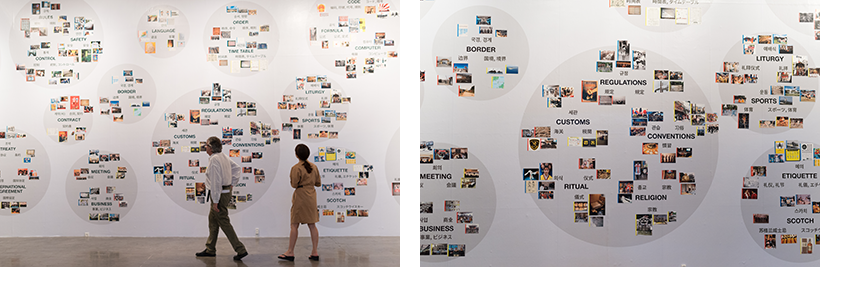
Collaborative researchers from the 3 countries on 40 topics (artist questions) such as family, marriage, gender, human right, business, territory, fashion, manga, hip hop and Individualism vs. Group situations. This collaboration with the respective researchers helps to redefine what is meant by Asian Protocols.
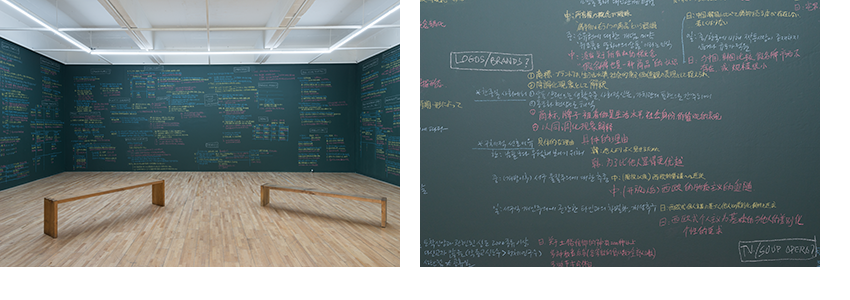
Begun in 1995, Muntadas’“On Translation” series takes into account not only the literal transcription of one language to another but also the cultural interpretation from one context into another. The work showcases 3 video projections about private and public spaces on sites of generic architecture.
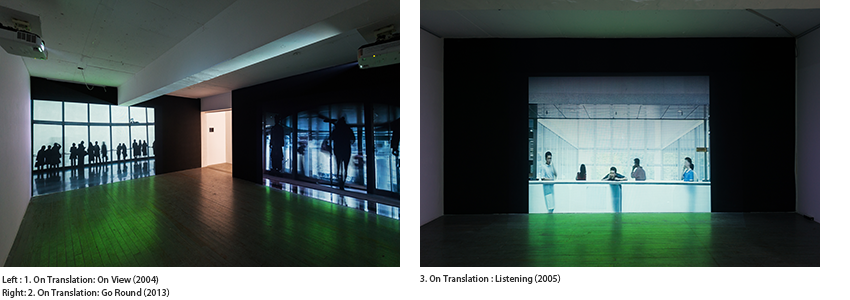
What is "public space" in East-Asia? In light of recent phenomena, such as the increasing trend towards high-rise building in the region, urban researchers will examine how the changing role of public space affects notions of identity, everyday life, home and the "right to the city" in the metropolitan arenas of Beijing, Seoul and Tokyo.
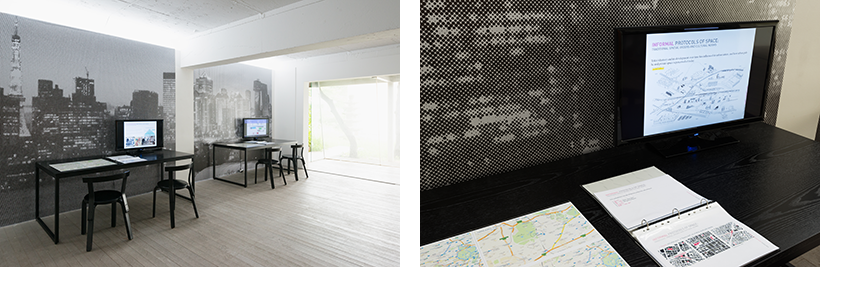
In 2006, Muntadas articulated a series of “adapters” in which he prescribed "effective to adapt " as medicine to each protocol. As included here: 43 bottles with pills labeled in 4 languages (Japanese, Chinese, Korean and English) are installed on 3 shelves.
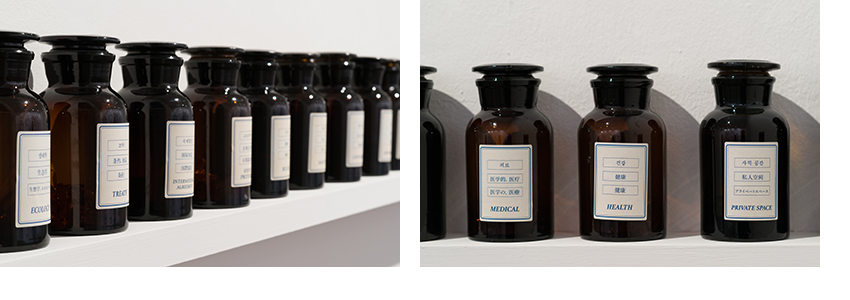
Muntadas collected numerous examples of objects and images from people who live away from their home country; Different Japanese, Chinese and Korean communities in diverse parts of world from Sao Paulo, Paris, Moscow, Barcelona and New York. The artist has presented here a collage of images such as word learning cards in 3 languages, magazines, comics, a map of traditional ceremonies, national sport and military parades. The installation is displayed in glass table cases.
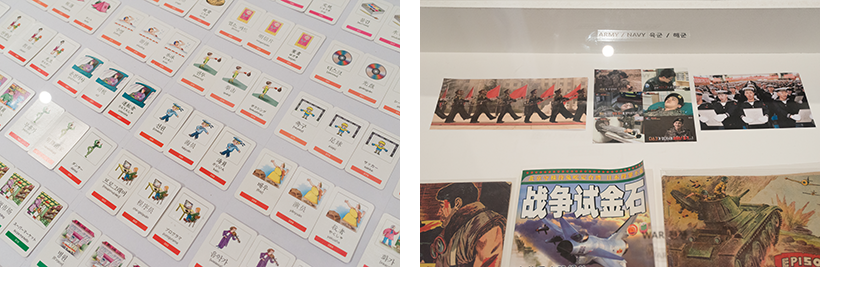
Photo collage of three kinds of ethnic towns located outside of their home country. For example, Korean town in Shinokubo, Tokyo / Wangjing, Beijing, China town in Yokohama / Incheon, Seoul and Japanese community area in Beijing and Seoul.
Comparative images of present Junior high and high school’s history textbooks of the 3 countries.
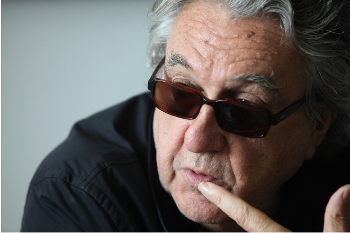
Antoni Muntadas was born in Barcelona in 1942. Since 1971, he has lived in New York. He is one of the early conceptual and media artists. Muntadas has been a visiting professor in many international institutions: Ecole des Beaux Arts In Paris, France,
the USP in Sao Paulo, Brazil, and at the School of Architecture at MIT in Cambridge from 1990 to 2014. He now teaches at the IUAV in Venice, Italy.
In his 40 year long career he created and produced many works under the term “Media landscape”(1977), an internet project about cultural censorship "The File Room" (1994). He also has been working for 20 years on the series "On Translation" (1995-) and the on-going project "Asian Protocols". In his work he addresses social, political and communication issues such as the relationship between public and private space within social frameworks, and investigates channels of information and the ways they may be used to censor or promulgate ideas. His projects have been presented in all media including photography, video, publications, the Internet, installations and urban interventions.
His works have been exhibited in international museums: The Museum of Modern Art in N.Y., the Berkeley Art Museum, C.A., the Musee Contemporain de Montreal, the Museo Nacional Centro de Arte Reina Sofia in Madrid, the Museo de Arte Moderno in Buenos Aires, and more. He has presented works at Documenta VI and X, Kassel, the Whitney Biennial of American Art, the 51st Venice Biennial, and those in Sao Paulo, Lyon, Taipei, Gwangju and Havana.
Since 2011 he has been working on the project Asian Protocols, first presented to the public in 2014 at the Total Museum in Seoul (South Korea), and in progress in Japan and China. In 2015 he was invited by the 72nd Venice Film Festival (part of the Biennale) to show in the public space his new work Derive Veneziane, a video projection dedicated to the city of Venice.
Video Screening, Image Forum, Tokyo 1991
NTT ICC’ 95 "on the Web," Tokyo 1991, Spiral Gallery , Tokyo 1995
"Critical Quest-The Role of the Criticism," Spiral Gallery, Tokyo 1995
Solo show, "Between the Frames: the Forum," Yokohama Portside Gallery 1997
The 1st City Video Installation "akihabara TV," command N/cube, Tokyo 1999
“Connecting World”, NTT/ICC, 2008
Lecture: Institute Francais Tokyo 1997/2004, Instituto Cervantes de Tokio 2009, Tokyo Zokei University 2009,
Tokyo Wonder Site 2015, BankART 2015, Tokyo University of Arts 2015
Dialog with Artist,Tadashi Kawamata, Tokyo, 2003, with Sociologist, Shunya Yoshimi, Tokyo 2004
Research: MIT, Tokyo Field Trip 2012
Residency program: BankArt 1929, Feb.-March 2015 , Tokyo Wonder Site July 2015
3331 Arts Chiyoda, Feb-March 2016
| Title | MUNTADAS: ASIAN PROTOCOLS |
|---|---|
| Date | March 20(Sun.) - April 17 (Sun) , 2016. 12 am - 7pm (everyday open, Last entrance: 18:30) |
| Venue | 3331 Arts Chiyoda 6-11-14 Sotokanda Chiyoda-ku Tokyo 101-0021, Japan |
| Admission Fee | General ¥ 800, Students / Age 65 and up ¥ 700 Passport tickets allow unlimited entry to the named holder. ID required/Free admission for Chiyoda Ward citizens, persons with disabilities and their companions. ※ Extra charge for the round table event at 3331 Arts Chiyoda |

What is "public space" in East-Asia? In light of recent phenomena, such as the increasing trend towards high-rise building in the region, urban researchers will examine how the changing role of public space affects notions of identity, everyday life, home and the "right to the city" in the metropolitan arenas of Beijing, Seoul and Tokyo.
[Date] March 4 (fri.) 19:00-21:30
[Venue] Embassy of Spain (1-3-29 Roppongi Minato-ku, Tokyo)
[Admission] Free
[Moderator] Jorge Almazan (Architect ,Senior Assistant Professor of Keio University)
[Speaker] JINNAI Hidenobu (Architectural Historian, Professor of Hosei University)
KIM Sung Hong ( Professor of architecture and urbanism of University of Seoul, Curator of Korean Pavilion, Architecture Exhibition, 2016 Venice Biennale)
CHEN Yu (Architect and Urban Historian, Assistant Professor of National University of Singapore
*Japanese/ English simultaneous interpretation available
More Information
This is an attempt to understand the condition of politics, society and culture through discussion of governmental censorship and the self-censorship of artists, museums, publishers, organizers and producers in the three countries with people who have experience of regulations on expression.
[Date] March 20 (Sun.) 16:00-19:00
[Venue] 3331 Arts Chiyoda
[Admission] ¥ 1,500 (¥700 For exhibition ticket holders / Free admission for students)
[Moderator] OZAKI Tetsuya(Chief Editor "Real Tokyo" and "Real Kyoto", Editor/Author "One hundred Years of Idiocy")
[Speaker] KATAOKA Mami (Chief curator of Mori Art Museum)
OKAMOTO Yuka (Editor, Culture producer, Activist, Kaze Kobo organizer "Hyogen no Fujiyu Ten"[Exhibition of Un-freedom of Expression] committee co-representative)
FURUMAI Yoshiko Freelance writer, Author "18 Voices from China"
*Japanese/ English consecutive interpretation available
More Information
Why can’t we communicate politically with both close and distant neighbors? It may be because we fear each other. We therefore discuss and identify factors of fear in daily life on both conscious and unconscious levels, in the realm of speech and media. We also try to discover approaches which will help us coexist despite friction between the three countries.
[Date] March 26 (Sat.) 13:00-16:00
[Venue] 3331 Arts Chiyoda
[Admission] ¥ 1,500 (¥700 For exhibition ticket holders / Free admission for students)
[Moderator] SASAKI Toshinao(Critic, Journalist, Author "The layering world", "To the Era of Gentle Realism")
[Speaker] ASANO Toyomi (Professor of political history of Japan at the School of Political Science and Economics of Waseda University, Author Teikoku Nihon no Shokuminchi Hosei
ASO Seiichiro (Journalist, NPO AsiaCommons Organizer, Author "The Beijing art village","How do the Chinese really think about the Japanese?")
SHIN Taejun ( Representative Director, Living in Peace )
*Japanese/ English consecutive interpretation available
More Information
Reservation required
(with name , e-mail, mobile phone number )
Email: ws1(at)3331.jp
*Please change "at" to @ mark.

3331 Arts Chiyoda
6-11-14 Sotokanda Chiyoda-Ku Tokyo 101-0021
- 1 min. from Tokyo Metro Ginza Line Suehirocho station (Exit 4)
- 3 min. from Tokyo Metro Chiyoda Line Yushima station (Exit 6)
- 6 min. from Toei Oedo Line Ueno-Okachimachi station (Exit A1)
- 7 min. from JR Okachimachi station (Southern Exit)
- 8 min. from JR Akihabara station (Electric City Exit)
3331 Arts Chiyoda
6-11-14 Sotokanda Chiyoda-ku Tokyo 101-0021, Japan
TEL:+81(0)3-6803-2441 / FAX:+81(0)3-6803-2442
E-MAIL: info(at)3331.jp (*Please change "at " to @ mark )
URL: http://www.3331.jp
March 4th (Fri.) 18:00- 18:40
Venue: Embassy of Spain , Auditoriumr
After the Press conference at the same venue,
Round Table 1 Public / Private Space - Identity, everyday life and the right to the city in the East-Asian Metropolis
March 4th ‘Fri. 19:00-21:30
(both Japanese/ English simultaneous interpretation available)
More Information
3331 Arts Chiyoda
6-11-14 Sotokanda Chiyoda-ku Tokyo 101-0021, Japan
TEL:+81(0)3-6803-2441 / FAX:+81(0)3-6803-2442
E-MAIL: pr(at)3331.jp (*Please change "at" to @ mark.)
URL: http://www.3331.jp
Press release (English) (PDF / 2,285KB)
Press release (Japanese) (PDF / 2,639KB)